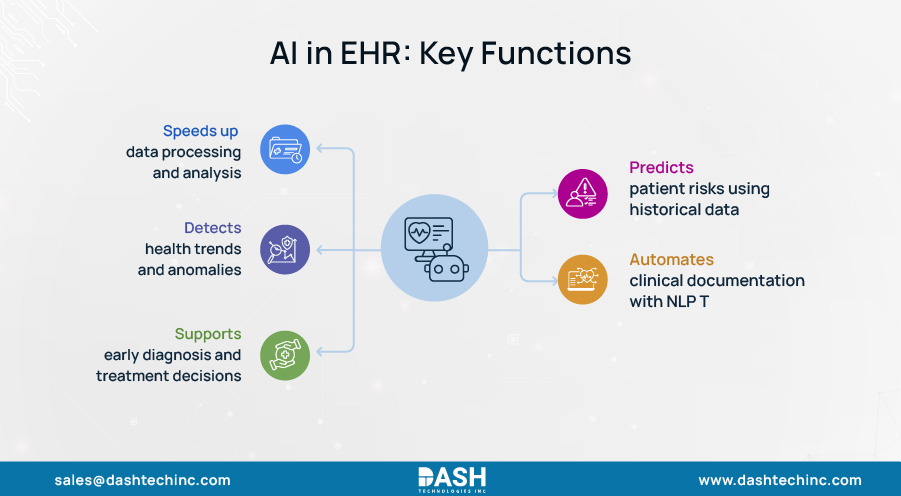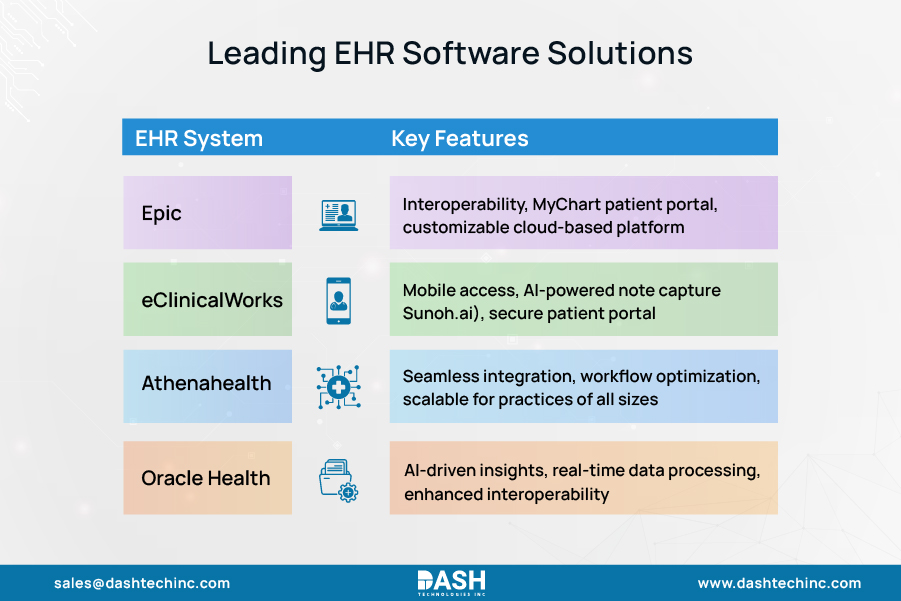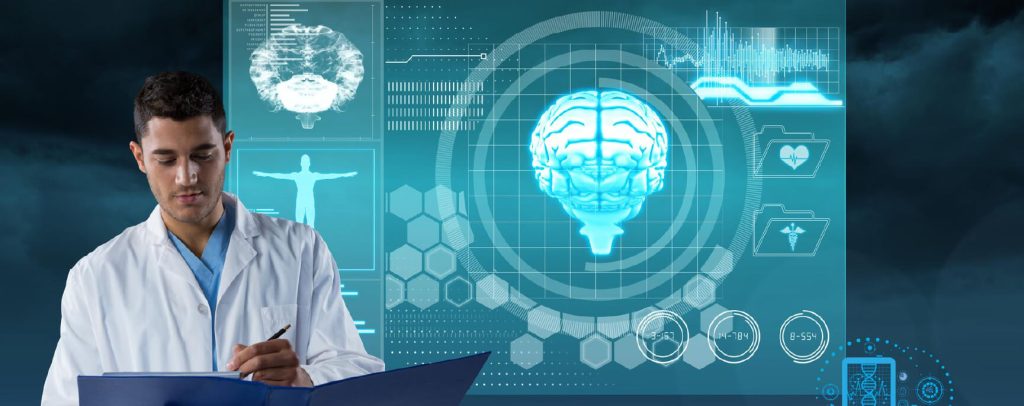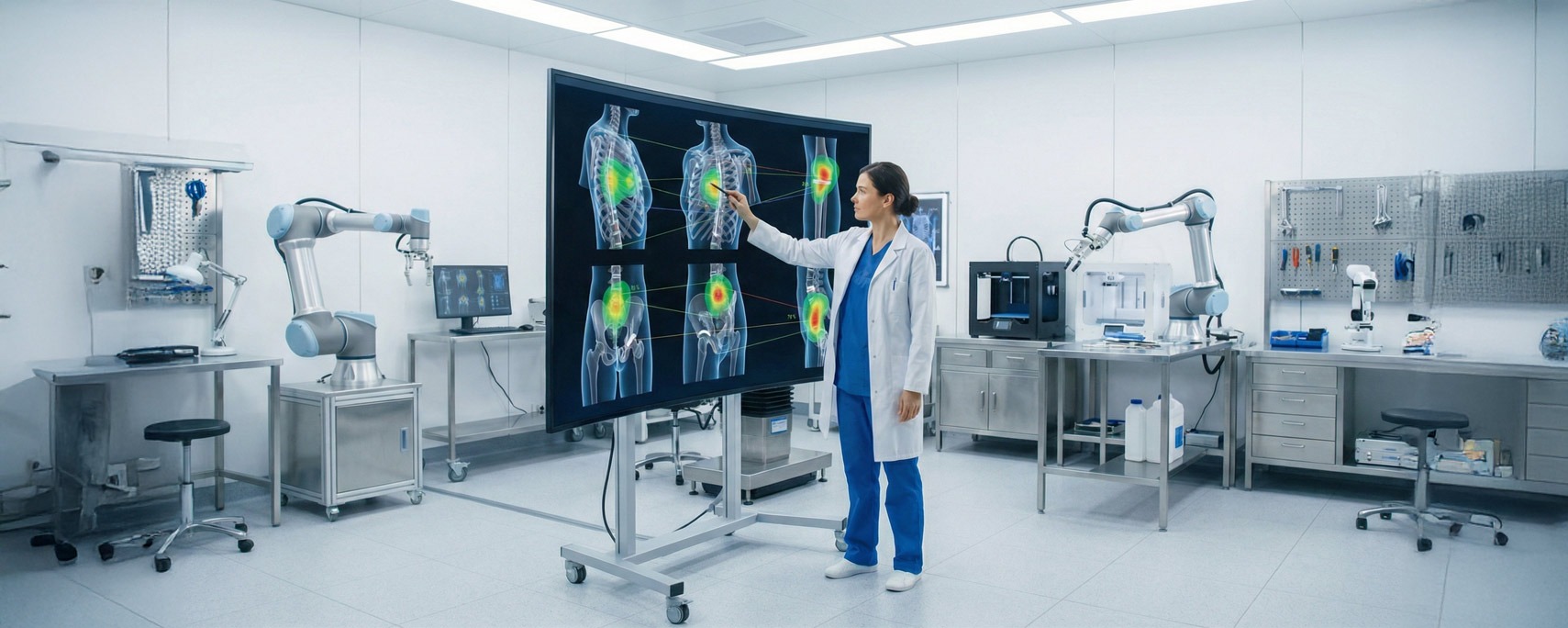Next-Gen Healthcare EHR Solutions: The Role of AI and Data Interoperability
Electronic Health Records (EHR) serve as the essential foundation of today’s healthcare system because they revolutionized the methods of storing, accessing, and managing patient information.
Electronic Health Records serves as the base of modern healthcare operations by transforming patient information management with enhanced record storage and retrieval functions. EHR software solutions enable providers to deliver safer and more coordinated patient care by centralizing data for instant access across all clinical settings.
The healthcare industry advances through AI improvements in EHR systems, utilizing predictive analytics and enhanced decision support, while interoperability facilitates seamless data exchange between platforms. These technological advancements are creating a future healthcare environment that prioritizes efficiency and patient-centered care while enabling organizations to deliver better outcomes through innovation.
The Evolution of Electronic Health Records (EHR)
The transition to EHR systems from paper charts represents a significant milestone in the advancement of healthcare technology. Secure digital platforms for centralized patient data storage eliminate the need for paper files and provide instant access to records. Key benefits include:
- The ability for healthcare providers to view patient medical files from any location at any time promotes better coordination among medical professionals.
- Automatic system updates minimize entry errors.
- Streamlined workflows decrease time usage and minimize administrative workloads.
Healthcare data interoperability projects, alongside regulatory mandates, have driven hospitals and clinics to widely implement EHR software solutions. Through this transition, healthcare operations become more effective, laying the groundwork for advanced systems that leverage data analysis.
The Role of AI in Healthcare EHR Solutions

AI technology enhances Healthcare EHR systems by improving data processing speed and usefulness for medical practitioners and patients. Originally, EHR functioned primarily to store data. AI now specializes in examining data to detect patterns and generate predictions.
AI’s Impact on Data Management and Analysis
- Artificial Intelligence processes large volumes of patient data rapidly within EHR software systems.
- The system detects significant trends, such as blood pressure spikes and changes in laboratory test results.
- Through this approach, doctors gain early access to health issues and enhance their medical decision-making process.
Predictive Analytics and Clinical Decision Support
- AI systems used in medicine can predict which patients are at risk for developing diseases.
- When patient records indicate diabetes risk factors, the system notifies the doctor.
- Clinical decision support enables AI systems to provide treatment recommendations to physicians.
Natural Language Processing (NLP) for Documentation
- AI tools that process spoken or written language save doctors time from manual notetaking.
- NLP technology transforms patient conversations along with handwritten notes to organize data within the EHR system.
Real-world examples:
– The Mayo Clinic utilizes artificial intelligence in its EHR system to enhance both patient diagnosis and care delivery.
– eClinicalWorks employs AI technology to optimize scheduling and patient alert systems.
The integration of AI with healthcare data interoperability enhances EHR software solutions which enables healthcare teams to provide faster and safer patient care that is also personalized.
Power Your EHR with AI and Interoperability
Build scalable, intelligent EHR solutions that deliver real-time insights and seamless care coordination.
Talk to Our ExpertsHealthcare Data Interoperability: Why It Matters
Healthcare data interoperability means that different EHR systems can talk to each other and share information easily. This is important because patients often visit multiple doctors, hospitals, or laboratories, and their health data needs to follow them. Without interoperability, information gets stuck in silos, making care slower and less safe.
Key Standards that Make Interoperability Possible
- HL7 FHIR: A modern standard that lets EHR software solutions exchange data quickly and securely.
- USCDI: A set of basic health data elements that every system should be able to share.
- Regulatory drivers: The ONC Cures Act and HIPAA are government regulations that encourage healthcare organizations to facilitate easier and safer data sharing.
Benefits of Healthcare Data Interoperability
- Doctors and nurses can see a comprehensive view of a patient’s health, even if care is provided in different settings.
- Fewer mistakes occur because everyone has access to the right information.
- Patients feel more in control since they can access and share their records.
- Interoperability is the backbone of modern Healthcare EHR, helping EHR software solutions deliver safer, faster, and more connected care.
EHR Software Solutions Leading the Way

Several EHR software solutions are leading the way in modern healthcare by combining advanced technology with flexible features. Epic, eClinicalWorks, athenahealth, and Oracle Health are among the top choices for organizations of all sizes.
Epic is recognized for its strong interoperability, enabling different healthcare teams to securely and efficiently share patient data. Epic’s MyChart patient portal empowers patients to schedule appointments, view their records, and message their care teams. Epic’s cloud-based system is highly customizable, supporting large hospitals and specialty practices.
eClinicalWorks offers mobile access, letting providers view patient information and manage care from any device. Its AI-powered tools, like Sunoh.ai, help doctors capture notes automatically. The patient portal gives patients secure access to their records and communication tools.
Athenahealth focuses on seamless data exchange, workflow optimization, and easy integration with other systems. Its solutions are scalable and adaptable for small practices or large networks.
Oracle Health utilizes AI to automate data entry, deliver real-time insights, and improve interoperability, thereby making patient care more connected and efficient.
These EHR software solutions support healthcare data interoperability, AI integration, patient portals, and mobile access, providing scalable and customizable tools for today’s healthcare leaders.
The Future: Trends and Innovations
Powerful new technologies and a shift toward more patient-focused care are shaping the future of Healthcare EHR. Cloud-based EHR software solutions allow doctors and patients to access records from anywhere, making healthcare more flexible and connected. Mobile integration enables providers and patients to utilize smartphones and tablets to manage health information, schedule appointments, and receive reminders.
Blockchain technology is emerging as a means to enhance the security and trustworthiness of Electronic Health Records. With blockchain, every change to a patient’s record is tracked and cannot be altered, protecting privacy and building trust.
The Internet of Things (IoT) connects devices such as wearables and home monitors directly to healthcare EHR systems. This means doctors can monitor a patient’s health in real-time, even outside the clinic, and respond quickly if anything changes.
Patient-centric models are putting people at the center of their care. EHR software solutions utilize data to personalize treatment plans and provide patients with more control over their health. The focus is shifting from just treating illness to predicting and preventing problems before they start.
Healthcare data interoperability is the key that links all these trends, enabling proactive, data-driven care that is safer, smarter, and more personal.
Final Thoughts
AI and healthcare data interoperability are transforming Healthcare EHR and Electronic Health Records, making care safer, faster, and more personal. To fully realize this potential, healthcare leaders, technology firms, and policymakers must work together. The collaboration will drive the development of better EHR software solutions and ensure that data flows securely across systems. The future promises a connected, efficient, and patient-centered healthcare system where information moves seamlessly, decisions are smarter, and every patient receives the best possible care.
Why Choose Dash Technologies for Your EHR Software Solutions?
Dash Technologies brings proven expertise in healthcare technology development, specializing in EMR/EHR integration, digitized automated operation room workflows, and ensuring data security with HIPAA & FDA compliance. Our approach to healthcare software development encompasses everything from device firmware to advanced medical imaging solutions. Contact us today!
About Dash

Dash Technologies Inc.
We’re technology experts with a passion for bringing concepts to life. By leveraging a unique, consultative process and an agile development approach, we translate business challenges into technology solutions Get in touch.







